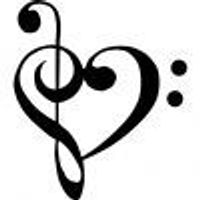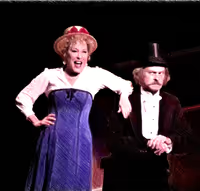What is so bad about bootlegs?
FindingNamo
Broadway Legend Joined: 7/22/03
#175What is so bad about bootlegs?
Posted: 9/26/13 at 8:54pm
ra·tion·al·ize
raSH nl. z,raSHn. lz
verb
attempt to explain or justify (one's own or another's behavior or attitude) with logical, plausible reasons, even if these are not true or appropriate. "she couldn't rationalize her urge to return to the cottage"
synonyms: justify, explain, explain away, account for, defend, vindicate, excuse
#176What is so bad about bootlegs?
Posted: 9/26/13 at 8:55pm
I think you may have missed the point,
spork goddess
#177What is so bad about bootlegs?
Posted: 9/26/13 at 9:20pmLiza I honestly don't want to get into it with you again, but you seem to be against bootlegs here, unless I misunderstood........... but on another equally contentious thread, you seem in favor of amateur groups posting their crap illegally all over YouTube. Am I misunderstanding?
#178What is so bad about bootlegs?
Posted: 9/26/13 at 9:28pmWow, that was fast. Glass Menagerie revival already available. I hear the black goo is hard for some to see even watching it in person.
#179What is so bad about bootlegs?
Posted: 9/26/13 at 9:42pm
"Glass Menagerie revival already available."
Of course it is!
Liza's Headband
Broadway Legend Joined: 5/28/13
#180What is so bad about bootlegs?
Posted: 9/26/13 at 9:57pm
Matt. Your attempt at entrapping me in some kind of hypocrisy with an "ah ha!" moment - ala gotcha journalism - is not going to work, seeing as you are trying to create some kind of abstract parallel outside of the context of that discussion. Nice try.
I'd strongly recommend that you go back and reread that entire thread. I stated that you were permitted to post up to 30 seconds, which was later confirmed and verified by a licensing rep at MTI. Feel free to private message if you'd like to continue that little disagreement. No need to hijack this thread for your own delusional enjoyment.
SporkGoddess
Broadway Legend Joined: 7/27/05
#181What is so bad about bootlegs?
Posted: 9/26/13 at 10:06pm
I think you may have missed the point,
spork goddess
I don't really see how I missed the point. This difference has been discussed time and time again during the debate about online piracy. There are reasons to be against bootlegging, but to compare it to theft is disingenuous.
http://www.nytimes.com/2012/03/29/opinion/theft-law-in-the-21st-century.html?pagewanted=1&_r=0
#182What is so bad about bootlegs?
Posted: 9/26/13 at 10:31pmI said you missed the point because Matt Rogers' post was pure satire, not a comparison, and it hit the nail on the head.
FindingNamo
Broadway Legend Joined: 7/22/03
#183What is so bad about bootlegs?
Posted: 9/26/13 at 10:55pmTo ignore copyrights and royalties is what's disingenuous, sporkg.
#184What is so bad about bootlegs?
Posted: 9/26/13 at 11:12pm
Again, as someone who does not own or watch bootlegs, and in fact as someone who has had to be the one to stop any sort of recording of a performance, I think some people here are being very sanctimonious. And some are also rationalizing.
Under the law, it is illegal. Cut and dry there.
In terms of personal morals- because people do things which are illegal but that they are not morally opposed to- I am not entirely sure I am against bootlegs in all circumstances.
If they are being used for archival purposes (and many theaters and aficionados certainly do this), who is being cheated out of something? What credit is being taken away? What ideas have been stolen and profited from?
Yes- bootlegs can, and have, been used to actually STEAL AND PROFIT FROM copyrighted ideas, from choreography to design. And they make it easier to do it. But they are not the sole cause.
Are bootlegs seen as a substitute for shelling out cash for a ticket? I suppose some would see it that way. I personally think that is wrong.
Are bootlegs sold for profit? Yes. That is no better than piracy.
But if a bootleg is an end to itself in the home of someone in the middle of nowhere, or kept in drawer in someone's room and eventually clung to as the only complete record of a show long gone- I don't see the harm, at an intellectual copyright / royalty level.
And Matt Roger's "satire" post is inane.
#185What is so bad about bootlegs?
Posted: 9/26/13 at 11:28pm
Kad- am I one of the people you think is trying to rationalize? I promise, I'm not. I think that recording can be incredibly distracting to performers and those around you, and it is illegal.
I was simply trying to explain the line copyright law draws between recording and distribution. (After all, I had to suffer through several months of studying copyright--it was torture-- so I'm pretty sure I know where that line is now.)
#186What is so bad about bootlegs?
Posted: 9/26/13 at 11:34pm
"If they are being used for archival purposes (and many theaters and aficionados certainly do this), who is being cheated out of something? What credit is being taken away? What ideas have been stolen and profited from? "
When a show/play is recorded for archival purposes, and I'm not referring to B rolls, it serves to benefit the creators, not to cheat them. Those recordings are made with state of the art equipment and not someone hiding their equipment in the frames of their glasses.
The creative team couldn't be happier that their work is being archived for posterity.
Don't compare an archival print to a bootleg, please.
#187What is so bad about bootlegs?
Posted: 9/26/13 at 11:36pm
No, you weren't someone I had in mind- and I found your explanation of the (admittedly confusing and outdated) laws helpful.
Perhaps you can confirm something for me:
Recently, you may recall, a link to a professionally taped recording of the original production of Pacific Overtures was shared on the board. This was shot for the purpose of broadcast in Japan, and it indeed was shown there. However, it was never subsequently broadcast anywhere else- or released in any medium. Now, despite the fact that the performers and designers undoubtedly had to sign a waiver and were probably compensated for the taping and initial broadcast, this upload is still illegal, correct? It is still a bootleg, despite having originally been authorized by the parties involved, right?
#188What is so bad about bootlegs?
Posted: 9/26/13 at 11:42pm
"Don't compare an archival print to a bootleg, please. "
I didn't say it was an archival print.
Community theatres, colleges, and smaller theatres across the country film their productions for their own private archives. Not professionally. A small camcorder in the sound booth, maybe.
Also common are for grade schools to record and tape productions for parents to purchase.
Correct me if I'm wrong, but both are illegal recordings, because when you purchase the rights to perform the play, you're generally not purchasing the rights to tape it.
#189What is so bad about bootlegs?
Posted: 9/26/13 at 11:48pmKad- Yes, you are right. The upload is still illegal. Basically copyright law boils down to unauthorized distribution of the copyrighted work (and in this case, that includes both the Broadway production and, as a separate aspect, the film production rights).
#190What is so bad about bootlegs?
Posted: 9/26/13 at 11:53pm
I'm talking about those instances when a broadway/off broadway performance is being recorded for the library or other sanctioned uses. You may have attended one of these performances. An entire professional crew makes the recording. Those are legal.
I would imagine that any recording of a theater piece made by the creators is legal. If you're sneaking a recording without permission it's illegal, of course. That's what I call a bootleg. And that's why we weren't even allowed to discuss bootlegs on this site a while ago.
#191What is so bad about bootlegs?
Posted: 9/26/13 at 11:56pm
i am aware of the legality of those.
I was not talking about them.
And, in terms of legality, an illegal upload of a legal recording is just as bad.
The legality of the issue cannot be debated.
oasisjeff
Broadway Star Joined: 11/15/07
#192What is so bad about bootlegs?
Posted: 9/27/13 at 12:06am
"The few of us who have made posts supporting the artists who created the work which is bootlegged haven't really received any comments addressing the fact that technically, you are stealing and that whether or not they should be legal, they still are not. "
There's nothing to debate there, really. It's sort of like someone saying "murder is wrong," and not getting any dissenting views.
I do think there is a precedent here, though, similar to scalpers reselling seats at much higher prices. Producers looked at that and said, "Hey, why isn't that our money?!?" and it's hard to find a decent seat at most shows that isn't a premium seat.
The same could be said for Broadway shows. If it's a potential additional revenue stream, this point would disappear. I've never bought into the notion that seeing a DVD of a show would make theater fans not see something live. If anything, we'd get to relive amazing productions gain and again...
I often wonder if there's an opportunity to monetize the archives and start selling them, with producers and the people involved getting compensated appropriately.
#193What is so bad about bootlegs?
Posted: 9/27/13 at 12:12am
As teen I briefly got into bootlegs--but I admit I found the quality so lacking that that was the main detriment to not bother anymore (this was, mind you back in the VHS days--I imagine something recorded digitally would look a lot better.)
This isn't quite the same thing, but at the same time there were a lot less Japanese anime titles that could be seen in English (subtitled or dubbed.) Fansubbers a they were called would translate the shows, make subtitles with their computer (of various translation quality) and the reputable ones would only make you copies if you sent them a video tape and return postage. It was kinda an honour thing--and if the titles would get licensed (like when Miyazaki's films were finally licensed by Disney) the belief would be you would no longer distribute the tape nor would they--in theory I think there was an honour system belief you would buy the release, but I'm not sure how many people did that. Of course there were some people who would then sell these tapes--online, through video stores, etc...
Not the same thing either, but there does seem to be a largely different take once a show is a certain age--like the excitement about those home movies of the original Follies--I never see anyone complain about them being posted...
It can be frustrating too when projects fall through--like the infamous thread on here about the end of those Broadway's Lost Treasures DVDs of Tony performances--complete with Wanda Richert from 42nd Street coming on here and blasting people for supporting the release.
FindingNamo
Broadway Legend Joined: 7/22/03
#194What is so bad about bootlegs?
Posted: 9/27/13 at 8:53am
"the belief would be you would no longer distribute the tape nor would they"
Oh, well, if that was the belief.
SporkGoddess
Broadway Legend Joined: 7/27/05
#195What is so bad about bootlegs?
Posted: 9/27/13 at 10:16am
It was kinda an honour thing--and if the titles would get licensed (like when Miyazaki's films were finally licensed by Disney) the belief would be you would no longer distribute the tape nor would they--in theory I think there was an honour system belief you would buy the release, but I'm not sure how many people did that.
That definitely didn't happen--fansubs still were widely distributed even after the anime was licensed. However, Japan had different laws about it than the USA did, so that was the loophole.
FindingNamo
Broadway Legend Joined: 7/22/03
#196What is so bad about bootlegs?
Posted: 9/27/13 at 10:45amHow like corporations some humans are. Searching out loopholes!
#197What is so bad about bootlegs?
Posted: 9/27/13 at 11:17amIt's interesting to note how time changes everything. A show taped today is considered theft while a recording taped 30, 40 or 50 years ago is considered a treasure. Most opera lovers are thankful that bootlegs were made of Maria Callas's performances. Most people I've spoken to say that what made her special could not be recorded in the studio. Her legacy continues because of the bootleg recordings that her fans made. They are now even sold commercially.
#198What is so bad about bootlegs?
Posted: 9/27/13 at 11:26amI can't wait for the next thread that's started about this in a few months where people have the exact same conversation again for the 500th time.
#199What is so bad about bootlegs?
Posted: 9/27/13 at 11:35amAnd in which everyone says to those with a different point of view "you've missed the point." As if disagreement could only come from ignorance.
Videos








